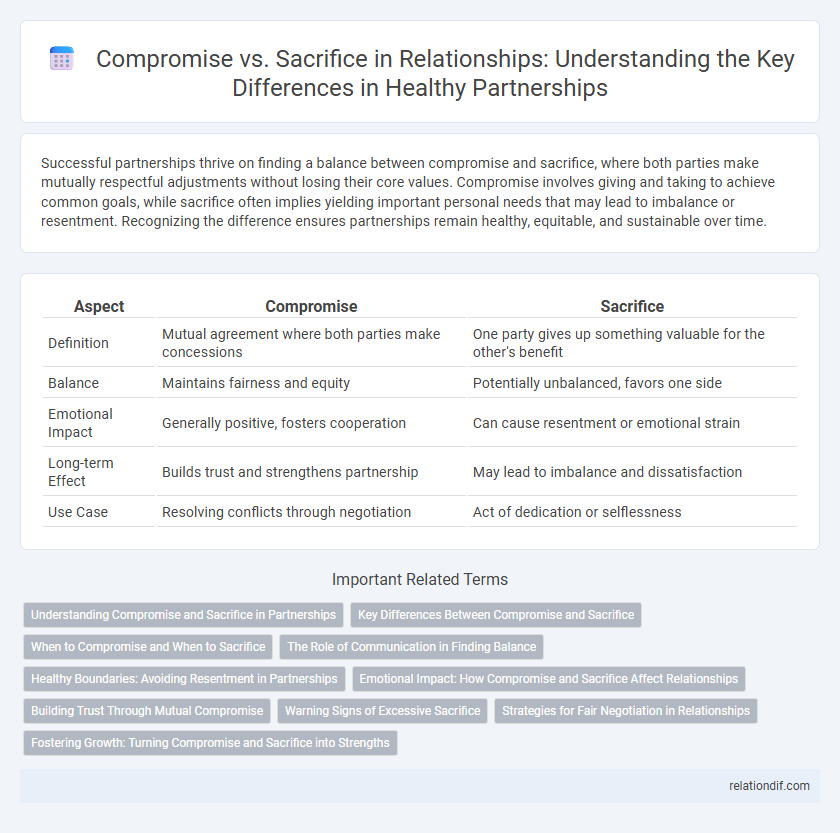Successful partnerships thrive on finding a balance between compromise and sacrifice, where both parties make mutually respectful adjustments without losing their core values. Compromise involves giving and taking to achieve common goals, while sacrifice often implies yielding important personal needs that may lead to imbalance or resentment. Recognizing the difference ensures partnerships remain healthy, equitable, and sustainable over time.
Table of Comparison
| Aspect | Compromise | Sacrifice |
|---|---|---|
| Definition | Mutual agreement where both parties make concessions | One party gives up something valuable for the other's benefit |
| Balance | Maintains fairness and equity | Potentially unbalanced, favors one side |
| Emotional Impact | Generally positive, fosters cooperation | Can cause resentment or emotional strain |
| Long-term Effect | Builds trust and strengthens partnership | May lead to imbalance and dissatisfaction |
| Use Case | Resolving conflicts through negotiation | Act of dedication or selflessness |
Understanding Compromise and Sacrifice in Partnerships
Understanding compromise and sacrifice in partnerships is essential for maintaining balance and mutual respect. Compromise involves both partners making adjustments to meet halfway, ensuring that each person's needs and preferences are acknowledged. Sacrifice requires one partner to forgo something important for the other's benefit, which should be approached carefully to avoid resentment and maintain a healthy relationship dynamic.
Key Differences Between Compromise and Sacrifice
Compromise involves mutual concessions where both partners adjust their needs or desires to reach a balanced agreement, reinforcing fairness and cooperation. Sacrifice occurs when one partner relinquishes their own interests or values for the benefit of the other, potentially creating an imbalance if not reciprocated. Understanding these key differences helps maintain respect and equity in a healthy partnership.
When to Compromise and When to Sacrifice
Compromise is essential in partnerships when both parties' core values align, allowing mutual concessions that strengthen trust and collaboration. Sacrifice becomes necessary when one partner prioritizes the relationship's long-term stability or the other's well-being over personal preferences or ambitions. Understanding the difference hinges on evaluating the impact on individual identity and the partnership's overall health, ensuring sacrifices do not lead to resentment or imbalance.
The Role of Communication in Finding Balance
Effective communication plays a crucial role in distinguishing compromise from sacrifice within a partnership by ensuring both parties openly express needs and boundaries. Clear dialogue fosters mutual understanding, preventing one-sided concessions that lead to resentment and imbalance. Prioritizing transparent conversations supports equitable solutions where both partners feel valued and heard.
Healthy Boundaries: Avoiding Resentment in Partnerships
Healthy boundaries in partnerships require distinguishing between compromise and sacrifice to prevent resentment. Compromise involves mutual give-and-take that respects each partner's needs, while sacrifice often indicates one-sided concessions that can lead to emotional exhaustion. Prioritizing open communication and setting clear limits helps maintain balance and fosters long-term relationship satisfaction.
Emotional Impact: How Compromise and Sacrifice Affect Relationships
Compromise fosters emotional balance by encouraging mutual understanding and respect, which strengthens the bond between partners. Sacrifice may lead to feelings of resentment or emotional depletion if one partner consistently gives up personal needs, potentially creating imbalance in the relationship. Healthy partnerships thrive on equitable compromise, ensuring both individuals feel valued and emotionally supported.
Building Trust Through Mutual Compromise
Building trust in a partnership hinges on mutual compromise, where both parties willingly adjust their expectations to meet halfway, fostering a balanced and respectful dynamic. Compromise involves collaborative problem-solving and flexible communication, which strengthens emotional bonds and ensures long-term stability. Unlike sacrifice, which may breed resentment, compromise nurtures trust by valuing each partner's needs equally and promoting shared growth.
Warning Signs of Excessive Sacrifice
Excessive sacrifice in a partnership often manifests through persistent neglect of personal needs and boundaries, leading to emotional exhaustion and resentment. Warning signs include one partner consistently prioritizing the other's desires at the cost of their own well-being, feelings of imbalance in decision-making, and a growing sense of invisibility or undervaluation. Recognizing these signs early can prevent long-term damage and promote healthier, more equitable relationship dynamics.
Strategies for Fair Negotiation in Relationships
Effective partnership negotiation hinges on balancing compromise and sacrifice to ensure fairness and mutual respect. Strategies include clearly defining boundaries, actively listening to each partner's needs, and seeking solutions that maximize mutual benefit without undermining individual values. Utilizing equitable communication techniques and setting realistic expectations fosters trust and long-term relationship stability.
Fostering Growth: Turning Compromise and Sacrifice into Strengths
Fostering growth in partnerships involves transforming compromise and sacrifice into mutual strengths by prioritizing open communication and empathy. Recognizing the value of each partner's needs and contributions encourages collaborative problem-solving and sustainable relationship development. This approach enhances trust and resilience, creating a foundation for long-term success and shared growth.
Compromise vs Sacrifice Infographic

 relationdif.com
relationdif.com